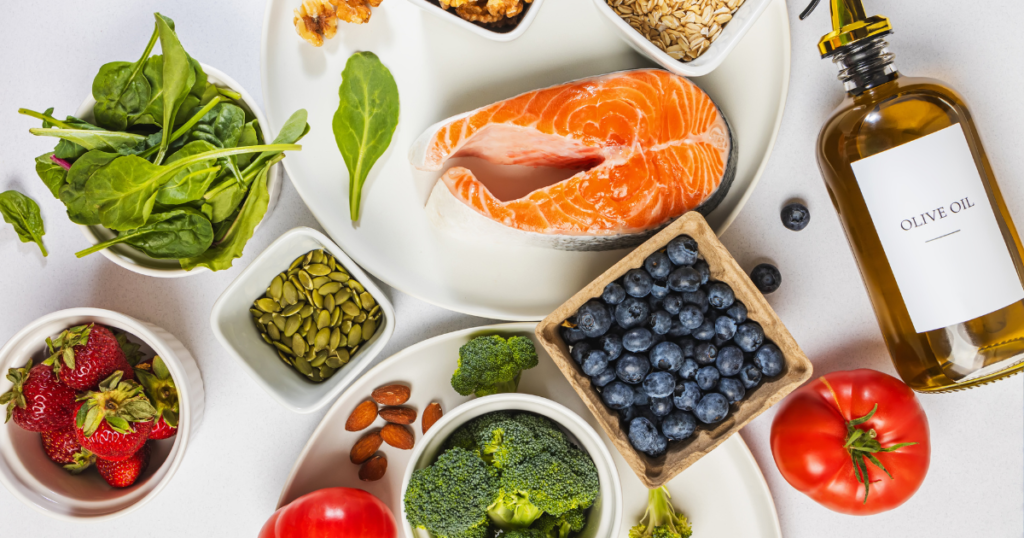
What we put into our bodies forms the foundation of our health, affecting everything from energy levels to immunity and inflammation. Chronic inflammation is at the root of many health issues, including heart disease, arthritis, autoimmune disorders, and even depression. Therefore, when looking to correct health problems, the most important step is improving our diet. Adding anti-inflammatory foods and herbs to your meals is a proactive way to support your body’s natural healing processes and promote overall wellness.
If you’re interested in learning more about inflammation and how it impacts your health, check out my previous blog post, Inflammation 101: What It Means for Your Health and How to Manage It.
Let’s dive into the importance of anti-inflammatory foods and herbs, their key active compounds, and how they can transform your health.
Why Inflammation Matters
Inflammation is the body’s natural response to injury, infection, or toxins, designed to protect and heal. However, when inflammation becomes chronic, it can damage tissues and contribute to long-term health problems. Anti-inflammatory foods and herbs work to modulate this response, helping the body heal without triggering harmful, prolonged inflammation.
1. The Role of Antioxidants in Reducing Inflammation
Antioxidants are compounds that neutralize free radicals—unstable molecules that cause oxidative stress, leading to inflammation. By including antioxidant-rich foods and herbs in your diet, you protect your cells from damage and support your body’s natural defenses.
Key Anti-Inflammatory Herbs and Foods:
- Turmeric: Contains curcumin, a powerful compound that reduces cytokine production (inflammatory markers). Turmeric is especially beneficial for joint health and chronic pain.
- Herbal Teas: Such as Chamomile, Roobios, and Ginger are rich in antioxidants and anti-inflammatory compounds. Chamomile, for instance, is known for its ability to calm inflammation and promote relaxation. Rooibos is packed with polyphenols that fight oxidative stress and inflammation, while ginger tea contains gingerols, compounds that help block inflammatory pathways and reduce pain.
- Rosemary and Cloves: Contain polyphenols like rosmarinic acid and eugenol, which suppress free radicals and inflammatory pathways.
- Vitamin C & E Sources: Citrus fruits, rose hips, and nettle provide essential vitamins that strengthen the immune system while reducing inflammation.
Why It Matters: Antioxidants reduce the risk of chronic diseases, including heart disease and cancer, and enhance the body’s ability to heal naturally.
2. Omega Fatty Acids: Key Players in Inflammation Control
Omega-3 Fatty Acids (ALA, EPA, DHA):
Omega-3s are known for their powerful anti-inflammatory effects, helping to reduce inflammatory molecules like cytokines and prostaglandins. They are crucial in managing chronic inflammation, often seen in conditions like arthritis and heart disease.
Key Sources:
- Purslane: A rich source of omega-3, 6, and 9.
- Hemp: A balanced source of omega-3, 6, and 9.
- Flaxseeds, Chia Seeds, Walnuts: Great plant-based omega-3s (ALA).
- Fatty Fish: Provide direct EPA and DHA.
Why It Matters: Omega-3s reduce chronic inflammation and support joint, heart, and brain health.
Omega-6 Fatty Acids:
Omega-6s are essential for immune defense and inflammation regulation. However, excessive omega-6 from processed oils can promote chronic inflammation.
Key Sources:
- Nuts and Seeds: Including pumpkin, sunflower, and hemp.
- Purslane: Contains omega-6 as well.
Why It Matters: Omega-6s are necessary for healing, but balancing omega-6 intake with omega-3s is crucial to prevent inflammation overload.
Omega-9 Fatty Acids (Oleic Acid):
Omega-9s have a milder anti-inflammatory effect but still help balance the body’s inflammatory response.
Key Sources:
- Olive Oil, Avocados, Nuts
Why It Matters: Omega-9s help support immune function and reduce chronic inflammation. An optimal balance between omega-3 and omega-6 is key for inflammation control. A ratio of 1:1 to 1:3 omega-3 to omega-6 is ideal for reducing chronic inflammation. Omega-3s calm inflammation, while omega-6s initiate it when necessary for healing.
Herbs Containing All Three Omega Fatty Acids:
Some herbs provide a balanced mix of omega-3, 6, and 9, which helps maintain natural inflammation control:
- Purslane: Contains all three omega fatty acids.
- Hemp: Offers a balanced ratio of omega-3, 6, and 9.
- Sea Buckthorn, Sacha Inchi, Perilla: All contain a combination of omega-3, 6, and 9, making them excellent sources for balancing inflammation.
3. Anti-Inflammatory Phytochemicals: The Plant Powerhouses
Phytochemicals are natural compounds in plants that actively combat inflammation by inhibiting enzymes and pathways that trigger inflammatory responses.
Key Phytochemicals and Sources:
- Curcumin (Turmeric): Inhibits inflammatory enzymes like COX-2 and reduces cytokine production.
- Gingerols (Ginger): Block prostaglandin synthesis, reducing pain and inflammation in conditions like arthritis.
- Capsaicin (Cayenne Pepper): Lowers substance P, a chemical linked to inflammation and pain.
- Rosmarinic Acid (Rosemary): Suppresses free radicals and modulates immune responses.
Why It Matters: Incorporating phytochemical-rich foods and herbs into your meals can help address inflammation at its root, supporting faster healing and improved overall health.
4. Alkalizing Foods and Herbs
Chronic inflammation often thrives in an acidic environment. Alkalizing foods and herbs work to balance the body’s pH, creating a less hospitable environment for inflammation.
Key Alkalizing Herbs:
- Nettle: Packed with minerals like magnesium and a natural pH balancer.
- Parsley and Alfalfa: These greens are highly alkalizing and nutrient-dense, aiding detoxification.
- Wheatgrass: A chlorophyll-rich superfood that restores pH balance and fights inflammation.
Why It Matters: A more alkaline diet reduces the burden on the body’s systems, leading to better energy, improved digestion, and less chronic pain.
5. The Importance of Gut Health and Fiber
A healthy gut is key to controlling systemic inflammation. Since much of the immune system resides in the gut, balancing gut microbiota is critical. Fiber-rich foods promote a healthy gut, while specific herbs act as prebiotics or have antimicrobial properties to balance gut bacteria.
Gut-Supporting Foods and Herbs:
- Licorice Root and Slippery Elm: Soothe the gut lining and balance microbiota.
- Flaxseed and Chia Seeds: High in fiber and omega-3s, supporting digestion and gut health.
- Garlic and Cinnamon: Antimicrobial properties help reduce harmful bacteria while promoting good bacteria.
Why It Matters: A healthy gut reduces inflammation throughout the body, improving immunity and lowering the risk of autoimmune conditions.
6. Mineral-Rich Foods and Herbs
Minerals like magnesium, zinc, and selenium are essential for controlling inflammation and supporting cellular repair.
Key Mineral-Rich Herbs and Foods:
- Nettle: A great source of magnesium, calcium, and iron.
- Horsetail: High in silica, which supports joint and bone health.
- Seaweed: Provides iodine and selenium for thyroid and immune function.
Why It Matters: Minerals are the building blocks of many anti-inflammatory processes and are critical for reducing pain and improving recovery.
7. Enzyme-Rich Foods for Inflammation
Enzymes like bromelain (from pineapple) and papain (from papaya) help reduce inflammation by breaking down proteins that trigger inflammatory responses.
Key Sources:
- Pineapple (Bromelain): Reduces swelling and pain, particularly in injuries or after surgery.
- Papaya (Papain): Aids digestion and reduces inflammation in the gut.
Why It Matters: Enzymes accelerate healing and improve nutrient absorption, making them essential for a comprehensive anti-inflammatory diet.
Practical Tips for Adding Anti-Inflammatory Foods and Herbs to Your Diet
- Start your day with an anti-inflammatory tea: Brew turmeric, ginger, and nettle for a powerful morning tonic.
- Incorporate greens: Add parsley, alfalfa, or wheatgrass to your smoothies or salads.
- Snack smarter: Swap processed snacks for a handful of walnuts or chia pudding.
- Spice up your meals: Use turmeric, cayenne, and rosemary to flavor dishes while supporting your health.
- Focus on balance: Aim for whole, unprocessed foods that are rich in nutrients and low in inflammatory triggers like sugar and trans fats.
